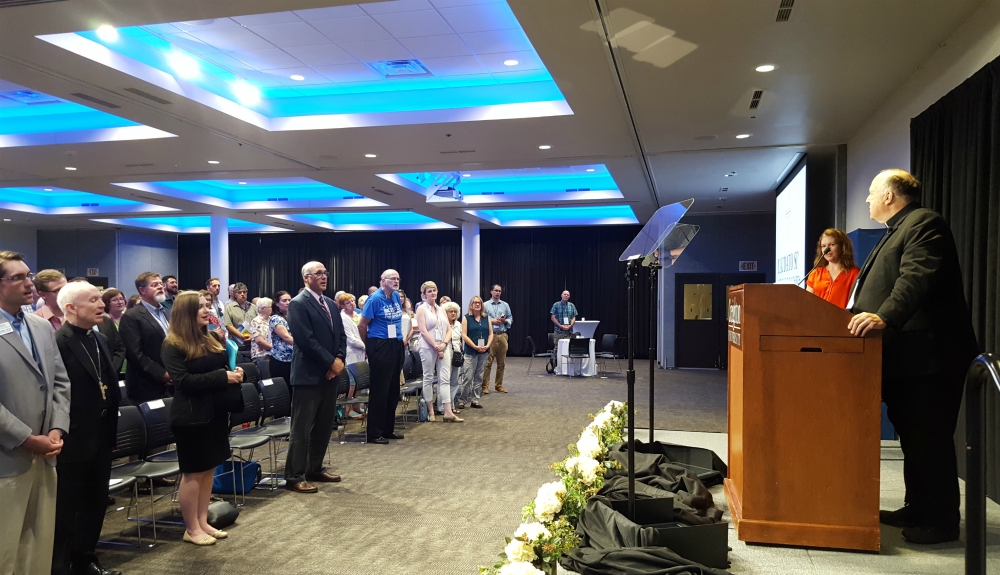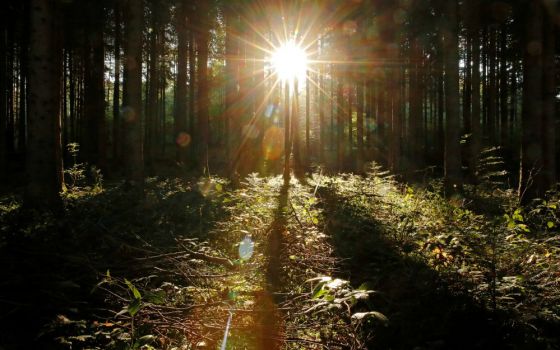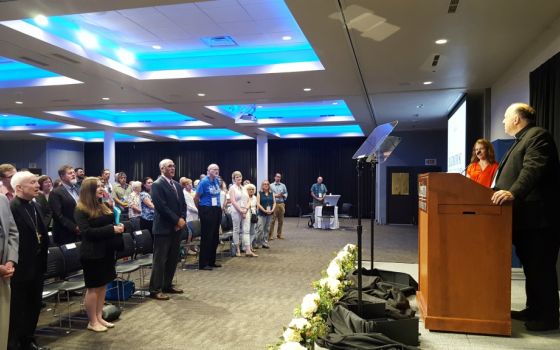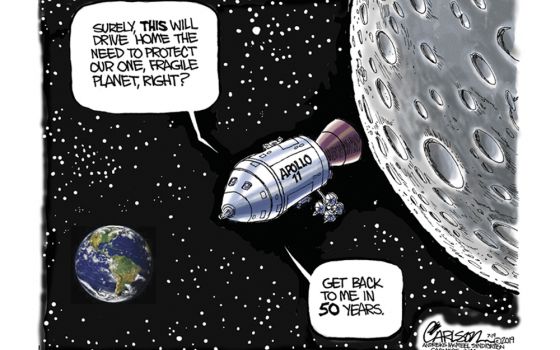
"The goal of this conference is to identify the pathways through which the Catholic community of the United States can help to forge a culture capable of confronting the environmental crisis," said Bishop Robert McElroy in his keynote address June 27 at "Laudato Si' and the U.S. Catholic Church" conference at Creighton University. (NCR photo/Brian Roewe)
San Diego Bishop Robert McElroy speaks during the inaugural "Laudato Si' and the U.S. Catholic Church" conference series June 27, at Creighton University in Omaha, Nebraska. (NCR photo/Brian Roewe)
Editor's Note: On June 27, Bishop Robert W. McElroy of the Diocese of San Diego delivered the opening keynote address at the inaugural "Laudato Si' and the U.S. Catholic Church" conference, at Creighton University, in Omaha, Nebraska. The conference series, co-sponsored by Creighton and the Catholic Climate Covenant, seeks to find ways to integrate Pope Francis' encyclical more deeply into the experience of the U.S. Catholic Church. McElroy's full prepared remarks, titled "PARADISE LOST: The Urgent Summons of Laudato Si' to the American People At this Moment in our History," are published below with permission.
In his epic poem, "Paradise Lost," John Milton captured the majestic drama of the fall and rise of humanity amidst the never failing love and power of God’s presence in the world. In the fourth book of the poem, Satan approaches the Garden of Eden, resolved to bring down Adam and Eve precisely because they have become a focus of God’s love and tender care. As he enters the Garden, Satan is stunned and overwhelmed by the sheer beauty of the Paradise that the Lord has created and bestowed upon the human family.But where once such overpowering loveliness would have turned his heart to God, now the very beauty of Paradise reminds Satan only of his own alienation from the Creator, and he despises the majesty of Creation, just as he despises its Creator. Speaking to the Sun, Satan cries out in pain.
O Thou, that with surpassing glory crowned,
Lookest from thy sole dominion like the lord
Of this new world; at whose sight all the stars
Hide their diminished heads, to thee I call,
But with not with friendly voice, and add thy name
O sun, to tell thee how I hate thy beams,
That bring to my remembrance from what state
I fell, how glorious once above thy sphere;
Til pride and worse ambition threw me down.
The lament of Satan is forged by his very estrangement from the world of incomprehensible magnificence which God had created and which Satan had deformed.
For us as men and women of the twenty-first century, this very same estrangement reverberates through our relationship with the earth that is our common home. Perceiving in the recesses of our soul the magnificence of the world that God has created for the entire human family, we yet allow selfishness, denial, the thirst for control, radical individualism and the rejection of God to forge a culture that progressively destroys the beauty and sustainability of the world which is our common home. And in that contradiction we are estranged from the created order which God bestowed upon the human family as the setting of our pilgrimage on this earth.
Laudato Si' both unmasks this estrangement and points to the pathway forward for us to move from alienation toward healing and the renewal of the earth. The encyclical is a call to arms for those who would rescue our bruised planet from the forces that deplete and destroy it. But Laudato Si' is so much more than this. For in its delineation of an integral human ecology, it emphasizes that the illnesses that plague our world on so many levels are interrelated, and that progress in any one dimension requires attending to the wholeness of the human person and the human family just as it attends to the wholeness of our planet earth.
For us in the United States at this perilous moment in our national history, the core themes of Laudato Si' are especially urgent. We stand, deeply estranged from one another, seething in divisions and unwilling to reconcile. We are the most powerful nation in the history of the earth, yet have rejected the only realistic pathways that have emerged to heal our broken planet. When Europeans came to the New World, they were often drawn by a vision of a New Paradise in which the raw beauty of the original creation was untouched. Now the earth calls out to us in agony, and we remain blind to the harm that we are inflicting more deeply with every passing year.
Laudato Si' is a call to reforge the bonds of solidarity that have been at the core of every advance that we have made as a people. It is a call to recognize the profound economic inequality that cripples us as a society and powers the engines of consumerism and technological recklessness that separate us from our planet, our brothers and sisters in the human family, and most piercingly of all, from the well-being of the generations who will come after us.
For us to heal the estrangement which imperils us as a nation and as a world, we must unmask the various levels of alienation that underlie it, and understand that only an integrated prism of analysis is capable of pointing to the profound healing that we must begin in these days.
We are the most powerful nation in the history of the earth, yet have rejected the only realistic pathways that have emerged to heal our broken planet.
Our Estrangement from God
As Pope Francis notes in Laudato Si', the beautiful words of Bartholomew, the Ecumenical Patriarch, frame the Christian conviction about the identity of the created order: "As Christians, we are also called to accept the world as a sacrament of communion, as a way of sharing with God and our neighbors on a global scale. It is our humble conviction that the divine and the human meet in the slightest detail in the seamless garment of God’s creation, in the last speck of dust of our planet."
The only possible stance of our humanity in the face of such divine love is that of awe and gratitude. And yet in the present moment of human history, our response to God's gift of the created order is on so many levels to deny the reality of God's identity as creator, to embrace a worldview that is forgetful of God.
Laudato Si' outlines clearly the nature of this forgetfulness which leads ineluctably to regarding creation not as gift to all, but as the possession of specific men and women and societies who have a right to exploit it for their private purposes.
Pope Francis provides the antidote for such a drive for possession and domination when he states: "The best way to restore men and women to their rightful place, putting an end to their claim to absolute dominion over the earth, is to speak once more of the figure of a Father who creates and who alone owns the world. Otherwise, human beings will always try to impose their own laws and interests on reality."
It is the estrangement of so many women and men from the recognition that the world is the gift of the Creator that is the primary and fundamental estrangement that endangers the earth. For this estrangement from God leads in turn to the denial that there is a universal destination for material goods because all such goods flow ultimately from the act of God in creation. The estrangement from God the Creator leads to the refusal to recognize that the whole of the human family is one precisely because we share one Father and one destiny. And most dangerously of all, this estrangement from the Creator sets in motion the acquisitive and dominating spirits of the human heart and soul that claim in their untrammeled grasping the right to own and utilize the created order without reference to the grandeur of creation's origin and its goal.
Our Estrangement from Nature
The trajectory of disenchantment in the modern world has brought many dividends in the advances in science, medicine and social analysis. But this despiritualization of contemporary life has also severed all too many the richest connections which we have as human beings with one another and with our world. In the process, it has led to the widespread denial of the spiritual identity of nature itself.
Laudato Si' makes this denial clear in its contrast between the technological paradigm that shapes the prisms of analysis that flourish in contemporary society and the spirituality emblazoned in the writings of Francis of Assisi.
The technological paradigm, according to Pope Francis, "exalts the concept of a subject who, using logical and rational procedures, progressively approaches and gains control over an external object. This subject makes every effort to establish the scientific and experimental method, which in itself is already a technique of possession, mastery and transformation." As Francis notes, men and women have long intervened in nature, but through most of human history proceeded from a desire to be in tune with nature itself. The technological paradigm establishes a relationship between the human person and nature which is singularly manipulative and instrumental. It is inherently extractive and utilitarian.
In contrast, Saint Francis of Assisi points to a relationship between nature and the human person which is inherently spiritual, respectful and loving. In the words of Laudato Si', "Saint Francis' response to the world around him was so much more than intellectual appreciation or economic calculus, for to him each and every creature was a sister united to him by bonds of affection.That is why he felt called to care for all that exists."
Advertisement
We in the United States experience with particular starkness the conflict between the technological paradigm and the affective bonds between nature and our humanity reflected in the spirituality of Francis of Assisi. We all experience at moments of our existence overpowering spiritual and moral bonds with nature and with the creation that blesses our world. But in practice those moments are overwhelmed by the technological substructure that underlays our society and draws us to increasingly treat nature in solely manipulative and instrumental ways.Thus we have become estranged from nature, unable to drink in and comprehend and contemplate the awe of God's creation. We find it impossible to, in the depths of our souls, speak of Brother Sun and Sister Moon because we cannot discern the spiritual identity of nature itself.And in this, we are impoverished and the earth is placed in peril, for our common home has become simply an object to be manipulated and used.
Our Estrangement from the Truth
One of the most surprising and dramatic elements of Laudato Si' lay in its bold proclamation of the empirical case that our earth is under attack by economic and extractive forces that are destroying our common home. From the issue of carbon dioxide pollution to the destruction of ecosystems, from the social and political effects of climate change to the quality of water and the destruction of biodiversity, the encyclical presents a litany of scientifically-informed conclusions that are stark and chilling.
Laudato Si' acknowledges that there are many issues pertaining to the environment that are complex and about which there is substantive and well-founded disagreement about how best to move forward. But it is unrelenting in its exposition of the reality that economic interests and pseudo-science are being deployed on a systematic basis to hide the dangers to our common home and protect the very forces that are ravaging our air, our water, and human life itself.
Laudato Si unmasks the reality that particularly here in the United States, we are estranged from the truth about the environment because we are becoming estranged from the very notion of truth itself. The great fear that Pope Benedict, who was a prophet about the environment and a prophet about the debasement of the truth, was that relativism would so corrode contemporary culture that men and women would surrender the very notion that there is truth that can be attained in this world. At this moment in our history as a nation, our political culture is submerged in a morass of conscious and repeated lies that wears down our collective culture of truth-seeking and substitutes for it a counterfeit culture rooted in the conclusion truth itself is only a vague illusion that cannot be realized in a complex world.
Laudato Si unmasks the reality that particularly here in the United States, we are estranged from the truth about the environment because we are becoming estranged from the very notion of truth itself.
Laudato Si' repudiates this moral and intellectual surrender and affirms unequivocally that the consensus of human inquiry into the environmental degradation of our planet reveals a powerful tide of man-made decline in our climate, our water, our soil and biodiversity. We must put aside our estrangement from the truth to redeem our natural environment, just as we must put aside our estrangement from political truth to redeem our political culture.
Our Estrangement from One Another
The final alienation that must be confronted for an integrated human ecology to take root in our nation and our world is the set of relationships within the human family itself.
Laudato Si' puts the matter very bluntly: "A sense of deep communion with the rest of nature cannot be real if our hearts lack tenderness, compassion and concern for our fellow human beings. It is clearly inconsistent to combat trafficking in endangered species while remaining completely indifferent to human trafficking, unconcerned about the poor, or undertaking to destroy another human being deemed unwanted. This compromises the very meaning of our struggle for the sake of the environment. … When our hearts are authentically open to universal communion, this sense of fraternity excludes nothing and no one."
For the United States at this moment in our history such a sense of communion requires shattering the false divisions that have destroyed the social and moral fabric of our country.Pope Francis points to the nature of these divisions when he writes "The current global situation engenders a feeling of instability and uncertainty, which in turn becomes a 'seedbed for collective selfishness.' When a people become self-centered and self-enclosed, their greed increases.The emptier a person’s heart is, the more he or she needs things to buy, own and consume. … a genuine sense of the common good also disappears.As these attitudes become more widespread, social norms are respected only to the extent that they do not clash with personal needs."
It would be hard to envision an analysis of our society more apt today than these words from Laudato Si'. The healing of our nation requires a collective conversion from the individualism and selfishness that generate division to the sense of solidarity that can alone build a truly human society. We must reject the words and the sentiments that build walls of rejection and categorization within our society, and we must reject a nationalism that betrays the finest strands of our nation's history and legacy by defining our country by what we are not rather than what we aspire to be.
The solidarity that can heal our estrangement from one another is not simply a social solidarity, but an ethical one. It is the compelling corollary of God's act of Creation as a gift and grace to the entire human family, conceived as one and destined to the life of eternity as one. But this corollary compels us to confront a final dimension of repairing the breach within the human family that estranges us God and one another — our duty to future generations.
The saddest moment in Milton's "Paradise Lost" occurs when God sends Michael the Archangel to lead Adam to the top of a great hill at the edge of the Garden of Eden and shows him a vision of humanity's future, a future that had been fractured by Adam's sin — the killing of Abel by Cain, the divisions of the people of Babel and the moral decay that led to the great flood of Noah.Weeping over these tragic consequences of his sinfulness for these unending generations of humanity, Adam cries out: "O visions ill forseen, better had I lived ignorant of the future and so had borne my part of evil only."
There is an overpowering urge for us in the present moment of environmental peril to also seek to live ignorant of the future and of the harm to future generations which our lifestyles and our personal choices are ratifying every day. Yet such a choice would be the ultimate betrayal of our humanity, and of the debt and stewardship that we owe to future generations to dramatically act to safeguard the earth.
Laudato Si' makes clear the conversion of heart that we must undertake: "We can no longer speak of sustainable development apart from intergenerational solidarity. Once we start to think about the kind of world we are leaving to future generations, we look at things differently, we realize that the world is a gift which we have freely received and must share with others. … Intergenerational solidarity is not optional, but rather a basic question of justice, since the world we have received also belongs to those who will follow us."
Intergenerational solidarity stands as the most compelling dimension of social justice on issues of the environment. For unless we recognize, as the bishops of Portugal stated, that our planet is on loan to each generation, which must then hand it on to the next, we will bear a guilt far greater than Adam’s.
Renewing the Culture of the World
Our estrangement from God, nature, future generations and the truth itself has created a moment of crisis and deepest peril for our planet. And it is in that moment of crisis and peril that we have come together in these days filled with the utter conviction that hope envelops us as our guide and our anchor.
In Laudato Si', Pope Francis made our mandate clear: "We are called to be instruments of God our Father, so that our planet might be what he desired when he created it and correspond with his plan for peace, beauty and fullness. The problem is that we still lack the culture needed to confront this crisis. We lack leadership capable of striking out on new paths and meeting the needs of the present with concern for all and without prejudice toward coming generations."
The goal of this conference is to identify the pathways through which the Catholic community of the United States can help to forge a culture capable of confronting the environmental crisis.Three initiatives will be vital to moving in this direction.
The first of these initiatives is the launch of a broad interfaith movement of religious and cultural renewal that is rooted in God's identity as Creator and proceeds to an abiding sense of giftedness. A culture of giftedness integrates the fact of creation with an inner disposition of heart and soul that recognizes the limits of individual or national claims to the possession of the created order. It includes in outlook and lifestyle the acknowledgement of the universal destination of material goods and the sanctity of every creature. Giftedness recognizes the social mortgage that exists on all property and possessions, reflecting the rightful claims of those who are marginalized and dispossessed. It is not the belief that America has received a special dispensation in human history to utilize the planet in pioneering ways. On the contrary, it is intrinsically linked to a stance of humility which acknowledges living in a land that has been blessed without carrying with that acknowledgement any sense of personal merit. Giftedness is the only moral response that we have to the material world which God has bestowed on each and every one of us in the human family. But it is a response that will require deep cultural conversion.
Our parishes and schools must become centers of truth-telling about the threats to God's creation which are indisputably rising in our world.
The second initiative that we must launch within the culture of the United States is the conversion from environmental denial to environmental reality.
This call to action on behalf of truth in the present moment arises from the stark and penetrating words of Laudato Si' that regarding the environment "things are now reaching a breaking point, due to the rapid pace of changes and degradation; these are evident in large scale natural disasters, as well as social and even financial crises, for the world's problems cannot be analyzed or explained in isolation. There are regions now at high risk, and aside from all the doomsday predictions, the present world system is certainly unsustainable …"
Our communities of faith must forge a new relationship with the leaders of science to reveal with ever-increasing effectiveness the dangerous pathway that we are on as a planet. Our parishes and schools must become centers of truth-telling about the threats to God's creation which are indisputably rising in our world. And we must call our own nation particularly into account, that we have let the United States, which has for so long been the leader in scientific inquiry, to countenance the wholesale spread of pseudo-science created by and in service to those industries and economic interests that despoil our planet.
The third initiative that the Catholic community in the United States should undertake is to empower children as the prophetic voice of environmental justice in our nation. It is children who most naturally understand the beauty and wonder of creation, and have the ability to summon the hearts and souls of adults to recognize once again the immense beauty of God's gifts and the spiritual identity of nature. It is no accident that Adam's greatest pain was in realizing the deprivation he had brought upon his children and grandchildren. Through the eyes, and the voices and the teaching of children, we must lead the adults in our society to comprehend the enormous deprivations that we are inflicting on future generations.
It is the children of our society who can open up the hearts of the current generation to care desperately about the future of our planet. It is the love that parents and grandparents have for all those who will come after them which has the capacity to open their minds to the empirical reality predicting increasing natural disasters, polluted skies and waters, and the powerful expansion of arid lands.
When Saint Michael led Adam down the hill in "Paradise Lost" after he had witnessed the suffering that his sin had brought to future generations, Adam lamented that he had ever lived, to have hurt his children and grandchildren in every generation. But, this was not to be the final word for Adam and Eve or for their descendants. For in "Paradise Regained" Milton shows Adam and Eve their salvation in Christ and concludes "though that first Paradise of earthly bliss in Eden had failed, a fairer Paradise is founded now for Adam and his children, whom thou a savior are come down to reinstall."
Let us in these days seek to build in God’s grace a fairer paradise on this planet which is our common home, and to secure its just future for all of humanity.







